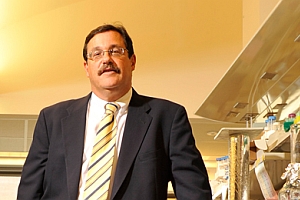Bioengineers at Rensselaer Polytechnic Institute in Troy, New York and University of California at Berkeley, have been awarded a grant from National Institutes of Health (NIH) to study how chemicals in drugs and the environment affect human stem cells. The four-year grant of more than $2 million will fund teams led by Rensselaer’s chemical and biological engineering professor Jonathan Dordick (pictured left) and Berkeley’s David Schaffer, professor of chemical and biomolecular engineering, who also is co-director of the Berkeley Stem Cell Center.
The researchers expect to test the hypothesis that stem cells, essential for the replacement of dead and damaged tissues in the body, react in different ways to chemicals than other cells in the body. The grant will allow researchers to study the affects of known chemical compounds — like those in drugs, pesticides, and other products — on adult stem cells.
The team also plans to develop a new predictive safety screening tool that manufacturers can use to test the toxicity of new chemical compounds on stem cells before their drug or other product reaches the market. “One of the goals would be that we would add a stem cell screening component,” says Dordick, “to the safety testing of a pharmaceutical candidate or to the assessment of the health effect of a chemical in the environment, say on our food.” The researchers expect to devise the test to work without the use of animals and at faster speeds than current tests.
In the study, researchers expect to use lab-on-a-chip technology that allows for quick testing of thousands of different chemicals on the surface of one simple, small chip, similar in appearance to a traditional glass microscope slide. The chip’s surface has hundreds of microscale spots of stem cell cultures, which will allow for the adding of different chemicals to each of these culture spots. The stem cells will then be analyzed for their reaction.
With this technology, hundreds of different chemicals, including drugs and drug combinations, can be tested on a single chip. The stem cells in the study are expected to be human adult neural stem cells and adult mesenchymal stem cells, grown in connective tissue.
Read more: Hopkins to Study Creating Blood Platelets from Stem Cells
* * *


 RSS - Posts
RSS - Posts
You must be logged in to post a comment.